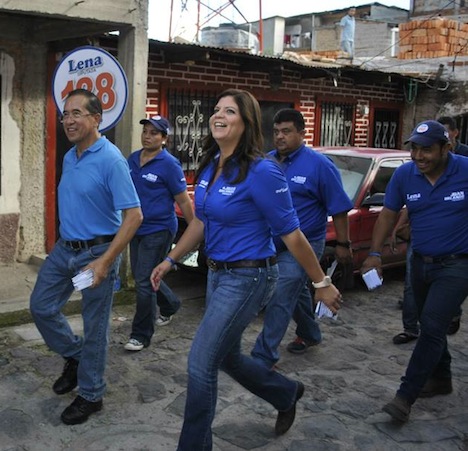TEGUCIGALPA — One of the most interesting aspects of the birth of the new leftist Partido Libertad y Refundación (LIBRE, Party of Liberty and Refoundation) in Honduras has been the way it’s opened the door to a new multipolar political system where there had once been just two traditional parties.![]()
The general consensus is that LIBRE is here to stay, no matter if its presidential candidate Xiomara Castro de Zelaya wins the November 24 presidential election. One of the reasons for its staying power is the likelihood that LIBRE remains very much in a three-way fight for seats to the Congreso Nacional (National Congress), Honduras’s 128-member unicameral legislature.
In the past, the predominance of the conservative Partido Nacional (PN, National Party) and the centrist Partido Liberal (PL, Liberal Party) meant that the winner of the presidential election could typically count upon a narrow victory in the National Congress as well.
But this year’s multi-party race means that there’s a real chance no party will win absolute control of the National Congress. While parties have failed to win an absolute majority in the past, the leading party has always fallen short by just a handful of seats. This year, the largest bloc could fall 10 or 20 seats short, given Honduras’s electoral system.
That means that the ultimate winner of the presidential election will face an immediate challenge of assembling a majority coalition. Given that many members of the Liberal Party and the National Party teamed up to support the 2009 coup against former president Manuel Zelaya and the ensuing interim regime of Roberto Micheletti, that could mean trouble if Castro de Zelaya, the wife of the former president, wins on Sunday. If the two traditional parties team up against her for the next four years, she would face a presidency of gridlock and a narrower mandate.
Other Hondurans believe that the ultimate winner could easily trade economic or political favors to buy — or at least rent — a congressional majority.
“The correct thing would have been to reform the electoral law, and to create a second round so that alliances could be formed,” said Germán Leitzelar, a former labor minister between 2002 and 2006 and a congressman representing the Partido Innovación y Unidad (PINU, Innovation and Unity Party). “Now, there won’t be any alliances, but there will be ‘economical understandings.’ It will be an agreement based on convenience, and not based on the best interests of the country.”
The National Party’s presidential candidate, Juan Orlando Hernández, is currently the president of the National Congress, where the National Party controls 71 seats to just 45 seats for the Liberal Party. Hernández’s wide majority makes him, in key ways, more powerful than outgoing Honduran president Porfirio Lobo Sosa, and he’s used his perch as congressional president to push through key legislation, including the ‘charter city’ law (subsequently overturned by the Honduran supreme court), a new security fee and the creation this autumn of a new military police.
But that’s not atypical. Since the return of regularly scheduled elections in 1981, the party that’s won the presidency has also won the largest share of seats in the National Congress. Between 2006 and 2009, Zelaya could count on 62 seats in the National Congress, just shy of an absolute majority. Between 2002 and 2006, former president Ricardo Maduro’s National Party controlled 61 seats.
What’s more, the congressional presidency has long been a stepping stone to the presidency — Lobo Sosa held the office between 2002 and 2006, Liberal president Carlos Flores held the office for four years prior to his election in 1997, and Rafael Pineda, the 2001 Liberal presidential candidate, also held the office.
If Hernández wins the presidency and the National Party claims dominance over the National Congress as well, the top two candidates to become the next congressional president are Lena Gutiérrez (pictured above, center) and Rigoberto Chang Castillo (pictured above, left).
Gutiérrez, at age 36, is a rising star of the Honduran right, and currently the first vice president of the National Congress. Fluent in English, Gutiérrez studied engineering at the Texas A&M University. She entered the National Congress in 2009, and she’s focused mainly on laws boosting education and development. Chang Castillo, a Tegucigalpa attorney, another rising star and a top Hernández ally, is the first secretary of the National Congress. Both hold seats from the department of Francisco Morazán, which includes Tegucigalpa and surrounding areas, and which will elect 23 members of Congress, more than any other department. The department of Cortés, which includes San Pedro Sula, Honduras’s second-most populous city and its industrial capital, will elect 20 members. In each department, a voter will have as many votes as the number of seats — a voter in Tegucigalpa will be allowed 23 congressional votes, but a voter in the Bay Islands department will have just one vote. Continue reading LIBRE, Nasralla could leave no party with majority in Honduran Congress
